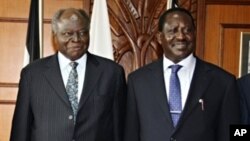Kenya's two warring leaders failed to meet Sunday, despite an earlier pronouncement that they would, as the nation's political impasse drags on.
Prime Minister Raila Odinga returned to Kenya on Sunday. His office had earlier announced he would meet with President Mwai Kibaki to discuss a resolution to the country's weeklong political spat, but Mr. Kibaki's aides later denied the meeting had been set.
Instead, Mr. Odinga held a rally at Nairobi's expansive Kibera slum, during which he re-iterated he is confident the dispute would be amicably settled. It is unclear when the two leaders will finally meet.
Analysts say that - behind the reformist rhetoric surrounding the dispute - political power grappling before the nation's next polls lies at the root of the quarrel.
The prime minister's party declared a "crisis", after Mr. Kibaki annulled two disciplinary suspensions Mr. Odinga handed down against two Cabinet ministers.
Aides to the prime minister say the ability to discipline the two falls within Mr. Odinga's government oversight powers. But the president's office, which denies the ruling coalition is facing a "crisis," claims Mr. Kibaki alone can force a minister to vacate his seat.
Although in early 2008 the two principals agreed, in theory, to an equal cut of power. President Kibaki has maintained the firmer hold on most key government functions.
The prime minister has indicated he will seek control over his portion of the unity Cabinet positions as a path out of the current deadlock. Although Mr. Odinga filled half the slots of the coalition government, he appears impotent to remove any of his own Cabinet members without the president's consent.
His weak position became apparent after he had a falling out with a key member of his own party, Agriculture Minister William Ruto. Ruto, who has become a fierce critic of the PM, was one of the two ministers Mr. Odinga tried to suspend.
Last week, a close ally and legal advisor to the prime minister Lands Minister James Orengo said under the power-sharing deal, Mr. Odinga has the power to both appoint and sack his own side of the coalition. He accused the nation's attorney general of misinterpreting the clauses of the accord.
Both sides of the coalition government have been implicated in a pair of corruption scandals that saw millions lost in funds meant to assist the country's needy.
More than $1 million is reported to have been stolen by officials in the education ministry. The funds were part of a program that is supposed to provide free primary education for the nation's children.
About $26 million is thought to have been lost in a food relief plan designed to close the country's food shortage. Well-connected individuals were awarded subsidized maize contracts and then sold the commodity at regular market price, reaping in exorbitant profit margins.
Also last week, Mr. Odinga's party called for the mediation of former U.N. chief Kofi Annan.
Kenya's Two Leaders Fail to Meet to End Impasse
- By Alan Boswell

Power struggle between Odinga, Kibaki threatens political deal negotiated two years ago to end weeks of election violence.



